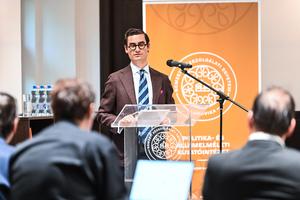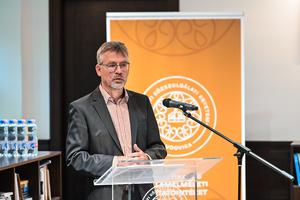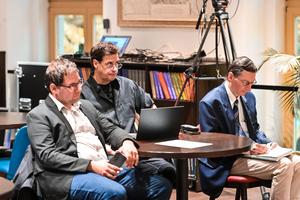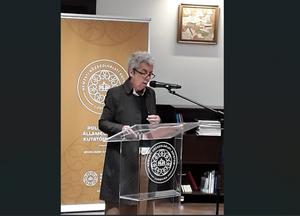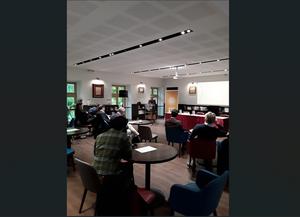On 4th October 2024, the Research Institute for Politics and Government at Ludovika UPS organized an international conference in Budapest on the relation of the late British conservative philosopher, Sir Roger Scruton to religion. The event took place at the John Lukacs Lounge of the Side Building at Ludovika UPS, and started with an introductory session, where the organizers of the conference, Ferenc Hörcher, director of RIPG, and Swedish philosopher Karl Gustel Wärnberg, an admirer and personal acquaintance of the iconic British philosopher, discussed the importance of the topic in Scruton’s thought. Wärnberg pointed to the priority of the Kantian and the secondary relevance of the Hegelian influence in the oeuvre. As he saw it, a sense of community was more important than doctrinal truth for the British philosopher. Prof. Hörcher stressed that the conference was not about Scruton’s personal faith, but about the role of religion in his philosophical, aesthetic and political views, while one cannot leave out of the picture Scruton’s relevance as a role model among conservatives. He explained the relevance of the topic for a research institute on politics and government the following way: art and culture are upstream from politics, and religion is upstream from art and culture, therefore without interpreting religion, neither art and culture, nor politics can be properly understood.
The first keynote lecture (From cult to culture among late Christians, the Scruton case) was held by French philosopher Chantal Delsol, who expressed her views on how cult had become culture in Western modernity, and on the philosophical impulses that shaped Scruton’s conservative thinking. According to Delsol, Scruton, whom he regards as an agnostic, was more committed to preserving the social function of Christian culture than to personal Christian faith, which had already been lost, anyhow, as a force of cohesion in the Western world. She also called attention of contemporary conservatives to the dangers of adaptation and reactionary escapism, pointing to Scruton’s example, who successfully avoided both vices, and highlighted the importance of aesthetic experience in a world deprived of its spiritual roots.
The following panel titled Love, tragedy, compassion consisted of three talks. In a recorded online lecture, James Bryson analysed Scruton’s interpretation of Wagner’s Tristan, The Ring Cycle and Parsifal. Titus Techera described the influence of German philosophy on Scruton’s views about tragedy as the articulation of man’s destiny. Ákos Windhager highlighted the key role of compassion in Scruton’s vision of Christianity illustrated by the example of the opera Anna (originally titled An angel passes) by David Matthews, for which Scruton wrote the libretto, as a path to reenchant the secularized world.
The second keynote lecture held online by Mark Dooley ‘scrutinized’ the concept of the sacred in Scruton’s thought, and argued that the late philosopher had become a man of faith in his final years, and not just an ‘aesthetically-minded tourist’ of religion, while referring to his own aesthetical-religious experience visiting Scruton’s grave.
Dooley’s talk was followed by Tamás Nyirkos’s analysis of Scruton’s critique of so-called ‘secular religions’, making strong arguments for the undefinability of what religion really is. Ádám Smrcz discussed Scruton’s interpretation of the antique Greek myths of Orestes and Antigone, arguing that for Scruton politics had a priority, if one had to choose between the political and the religious solution of a problem.
A third and final keynote of the conference, an online lecture by distinguished British philosopher Anthony O’Hear, analysed ‒ on the basis of the aforementioned opera libretto Anna, and Scruton’s interpretation of Wagner’s Parsifal ‒ the relation of freedom and a secular worldview, and the disappearance of God when freedom arrived. O’Hear gave an in-depth overview of Scruton’s views on the human condition and on mankind’s relation to God, on the role of suffering, compassion, and forgiveness, and on how the acceptance of unchosen commitments with gratitude is connected to the sacred.
The conference finished with a vivid closing discussion on the topic, including debates about the influence of Kant and Hegel, and of Burke and Heidegger in shaping Scruton’s thinking, as well as the epicurean aspect of enjoying life for its own sake in Scruton’s work and personal life.
Kálmán Tóth
research fellow
Research Institute for Politics and Government
Ludovika UPS, Eötvös József Research Centre
